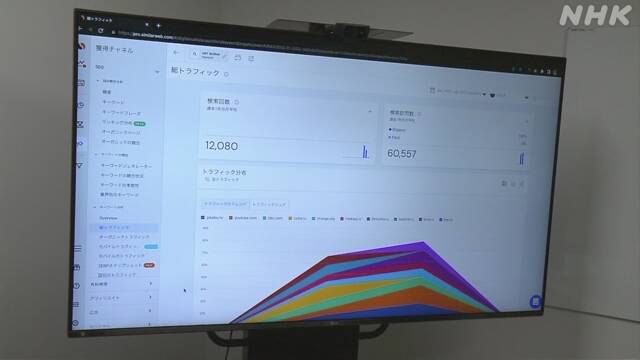A search of words searched on the Internet in Russia revealed that the search for words related to "anti-war" had increased sharply in February after the start of a military invasion of Ukraine, and then decreased significantly last month. Experts say, "It shows that the oppression of Russian civil society is getting stronger, such as cracking down on the anti-war movement."
The analysis result is
"Similar Web Japan," which supports the analysis of Internet access data, investigated changes in the number of words searched in Russian from PCs in Russia since January.
When we estimated the number of searches for a specific word from data collected anonymously from websites and apps, "Ukraine" was mainly searched with words such as "latest news", and searches combined with related words. In February, when the military invasion began, the number of news reports increased to 5.2 million, which is about 13 times that of January, but it has been on a downward trend since then, and was 2.2 million last month (April). It had decreased to less than half of February.
Also, the word "anti-war" is mainly searched for "protest", "petition", the name of the signing site, etc., and the number of searches combined with related words is an estimated value in February. It increased to more than 960,000, which is about 10 times that of January, but it has also decreased since then, and last month it was about 110,000, which was less than one-eighth of February.
Russian political expert "The level of oppression on civil society has risen"
Regarding this result, Professor Shuhei Mizoguchi of Hosei University, who is familiar with Russian politics, said, "In early March, the law prohibited words and deeds that would damage the credibility of the Russian army. Along with that, it seems that the number of online searches for "anti-war" is decreasing. "
On top of that, "Initially, it seems that there were a certain number of people who wanted to participate in the anti-war movement and searched for places for demonstrations, but participating in anti-war demonstrations itself has become a high-risk act. It shows that the level of oppression of civil society has risen even further in Russia, which was originally an authoritative country with increased crackdowns on the movement. "
"Censorship" more than doubled in 2 months
In addition, the number of searches for the word "censorship" was more than 4,000 in February, but it increased to about 10,000 last month (April), and it is a service that can encrypt communications and avoid censorship. The number of searches for "VPN" was about 360,000 in March, more than five times that in February, and Professor Mizoguchi said, "Let's escape censorship and obtain overseas information as information control in Russia becomes stronger. There is also a movement to say that more and more people are feeling that free civil life is beginning to be restricted more than ever. "
On top of that, Professor Mizoguchi said, "For the administration, it can be seen that it has succeeded in suppressing the anti-war movement by the citizens. I would like to pay attention to how much the anti-war movement can be suppressed and how much the anti-war movement will expand in the future. "

